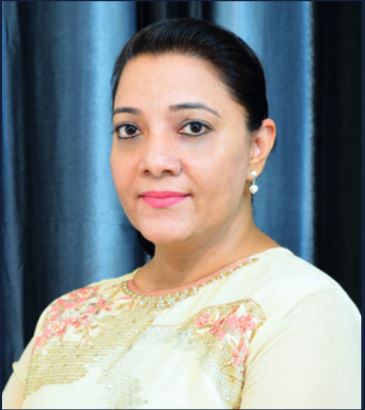Connecting Learning to the Future

Dr. Shradha Kanwar, Head - Learning and Development iNurture Education Solutions
There is a loud noise announcing the arrival of bots and machines, overpowering every human faculty. Although these drastic shifts might not be that conspicuous in the immediate future, the implications on learning shall be multifarious and now. The fourth industrial revolution heralds the beginning of new knowledge frontiers resulting in altered learning paradigms. The classrooms of the future shall be more connected; transcending conventional boundaries, and evolving into intelligent nurturing spaces. Learning ambiences intertwined in the past because of time and space shall, in the future, have a different texture as an augmented phygital network drawing out the finest learning potential.
As researchers divulge new insights on technology enablement through virtual and augmented reality, and as artificial intelligence becomes more pronounced, learning scenarios shall become more dynamic and a real-time choreographic delight. In these exciting, engaging and enriching times, the role of teachers shall transform towards becoming LEDs (Learning Experience Designers), demonstrating a more calibrated, holistic and continual involvement in catalyzing the learning experience. And if the question is what will change, the answer is everything. From the ambiance of learning to learn constructs, to building self-defining learning paths and understanding how the learning power is amplified using analytics; change will be the constant.
"Young, bright, sparkling minds need to be kindled by designing relevant, immersive, experiential constructs in order for them to experience the creative excitement"
Learning Ambiences: The first impression of convergence technologies shall be felt in the way an education institute is designed with more open and networked spaces, where the tenor and feel of the ambient environment shall help liberate young minds and joyfully indulge in curious conversations. The entire spectrum of learning engagements shall resonate research and discovery leading to innovative thinking, an essentiality for the centennials of tomorrow.
Learning Constructs: Young, bright, sparkling minds need to be kindled by designing relevant, immersive, experiential constructs in order for them to experience the creative excitement. The hallmark of future learning shall be characterized by coalescing the world of work and the world of learning, where learners shall develop, explore and cultivate ideas to bring scholarly innovations into the enterprise world. Digital fluencies shall play a major role in how these learning constructs shall be judiciously designed and meticulously executed to handle real-world problems.
Learning Simulators: The information processing power of the human brain can be best exploited by judiciously exposing it to various modalities of learning that simulate real-world experiences. This shall be a major breakthrough in the future, where learning shall become a beautiful amalgamation of various sensory perceptions converging to an intuitive, intelligent Meta cognized response. It would be wonderful to be able to simulate a real-world scenario and take future scholars to a different level of cerebral immersion.
Learning Analytics: With fantastic attainments in Data Science impacting decision-making like never before, opportunities to leverage and contextualize metadata and smartly use analytics shall become defining influences in the learning space. Scientifically attuned data, obtained from various fronts, shall help in providing authentic, descriptive and predictive indicators of learners' progression and drive smart choices. A lot of these insights will have a pervasive impact on tweaking the learning experience in real-time.
Customised Learning: The realization of individual differences in terms of learning patterns, intelligence and styles has already been a much popular topic of today's times. One essential facet of the learning ecosystem of the future, therefore, shall be to build on the foundational scholarship of differentiated learning designs. Technologies of the future shall help establish this with marked precision and customize the learning to truly make it extraordinary.
Unlearning and New Learning: As bespoke learning designs gain prominence, the ability to rethink learning shall become the vital criteria for effective learning. This rethinking- the concentrated powering of the learning process shall become an ongoing process of inducing novelty; resulting in resurfacing of bright, new ideas. It will be this ability to realize the problem and restructure scenarios that will help deal with unprecedented and wicked problems of the future.
Self-directed Learning: The future of learning shall witness the rise and evolution of the self. Learning shall not be limited to the consequence of an external intervention, but shall be a reflection of the powerful human mind. Where situations of the future shall compel the need to handle a tirade of conflicts between the mind and the machine, it will be the rise of the advanced, more intelligent human mind that shall govern human supremacy. This super prowess shall only be with those whose learning potential remains in sync with the times.
Gone are the days, when learning occurred within constrained, indelible boundaries. Learning in the future shall not be defined or imprisoned in the shackles of time, space or entity. Instead, the entire process of learning shall be a beautiful osmosis of exquisite experiences. It is important that we don't just wait for these times with bated breath, but empower ourselves to rise and participate in the change. As technology enablement through virtual and augmented reality becomes more effective, and as artificial intelligence becomes more pronounced, learning scenarios shall become more dynamic and a real-time choreographic delight
Dr. Shradha Kanwar
An academic professional with over 20 years 'experience in learning innovation leadership, interdisciplinary knowledge building, future-work integration, strategic performance and 21st century meta-competence development Dr. Shradha Kanwar is an MPhil and Ph.D. holder. Dr. Kanwar's core research and work is around futuristic education strategies including, but not limited to, developing hybrid research-based inventive learning solutions, establishment and direction of performance and talent enhancement systems, and design and set-up of Learning Centres of Excellence for future learning-work environments.
As researchers divulge new insights on technology enablement through virtual and augmented reality, and as artificial intelligence becomes more pronounced, learning scenarios shall become more dynamic and a real-time choreographic delight. In these exciting, engaging and enriching times, the role of teachers shall transform towards becoming LEDs (Learning Experience Designers), demonstrating a more calibrated, holistic and continual involvement in catalyzing the learning experience. And if the question is what will change, the answer is everything. From the ambiance of learning to learn constructs, to building self-defining learning paths and understanding how the learning power is amplified using analytics; change will be the constant.
"Young, bright, sparkling minds need to be kindled by designing relevant, immersive, experiential constructs in order for them to experience the creative excitement"
Learning Ambiences: The first impression of convergence technologies shall be felt in the way an education institute is designed with more open and networked spaces, where the tenor and feel of the ambient environment shall help liberate young minds and joyfully indulge in curious conversations. The entire spectrum of learning engagements shall resonate research and discovery leading to innovative thinking, an essentiality for the centennials of tomorrow.
Learning Constructs: Young, bright, sparkling minds need to be kindled by designing relevant, immersive, experiential constructs in order for them to experience the creative excitement. The hallmark of future learning shall be characterized by coalescing the world of work and the world of learning, where learners shall develop, explore and cultivate ideas to bring scholarly innovations into the enterprise world. Digital fluencies shall play a major role in how these learning constructs shall be judiciously designed and meticulously executed to handle real-world problems.
Learning Simulators: The information processing power of the human brain can be best exploited by judiciously exposing it to various modalities of learning that simulate real-world experiences. This shall be a major breakthrough in the future, where learning shall become a beautiful amalgamation of various sensory perceptions converging to an intuitive, intelligent Meta cognized response. It would be wonderful to be able to simulate a real-world scenario and take future scholars to a different level of cerebral immersion.
Learning Analytics: With fantastic attainments in Data Science impacting decision-making like never before, opportunities to leverage and contextualize metadata and smartly use analytics shall become defining influences in the learning space. Scientifically attuned data, obtained from various fronts, shall help in providing authentic, descriptive and predictive indicators of learners' progression and drive smart choices. A lot of these insights will have a pervasive impact on tweaking the learning experience in real-time.
Customised Learning: The realization of individual differences in terms of learning patterns, intelligence and styles has already been a much popular topic of today's times. One essential facet of the learning ecosystem of the future, therefore, shall be to build on the foundational scholarship of differentiated learning designs. Technologies of the future shall help establish this with marked precision and customize the learning to truly make it extraordinary.
Unlearning and New Learning: As bespoke learning designs gain prominence, the ability to rethink learning shall become the vital criteria for effective learning. This rethinking- the concentrated powering of the learning process shall become an ongoing process of inducing novelty; resulting in resurfacing of bright, new ideas. It will be this ability to realize the problem and restructure scenarios that will help deal with unprecedented and wicked problems of the future.
Self-directed Learning: The future of learning shall witness the rise and evolution of the self. Learning shall not be limited to the consequence of an external intervention, but shall be a reflection of the powerful human mind. Where situations of the future shall compel the need to handle a tirade of conflicts between the mind and the machine, it will be the rise of the advanced, more intelligent human mind that shall govern human supremacy. This super prowess shall only be with those whose learning potential remains in sync with the times.
Gone are the days, when learning occurred within constrained, indelible boundaries. Learning in the future shall not be defined or imprisoned in the shackles of time, space or entity. Instead, the entire process of learning shall be a beautiful osmosis of exquisite experiences. It is important that we don't just wait for these times with bated breath, but empower ourselves to rise and participate in the change. As technology enablement through virtual and augmented reality becomes more effective, and as artificial intelligence becomes more pronounced, learning scenarios shall become more dynamic and a real-time choreographic delight
Dr. Shradha Kanwar
An academic professional with over 20 years 'experience in learning innovation leadership, interdisciplinary knowledge building, future-work integration, strategic performance and 21st century meta-competence development Dr. Shradha Kanwar is an MPhil and Ph.D. holder. Dr. Kanwar's core research and work is around futuristic education strategies including, but not limited to, developing hybrid research-based inventive learning solutions, establishment and direction of performance and talent enhancement systems, and design and set-up of Learning Centres of Excellence for future learning-work environments.

